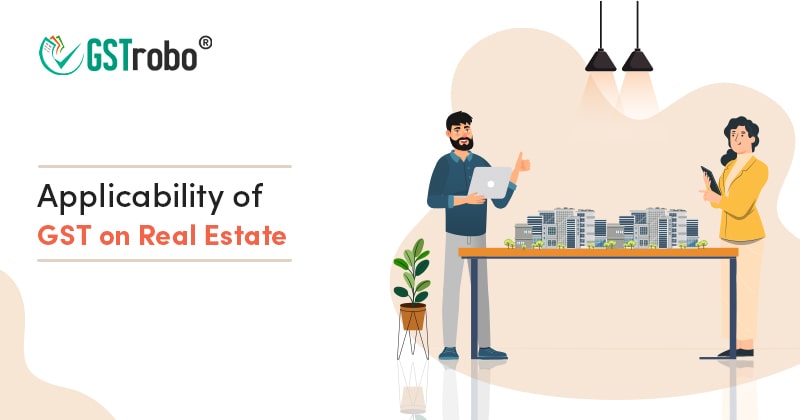Applicability of GST on Real Estate
The Goods and Services Tax (GST) is a destination-based tax levied on the final destination or consumption of goods or services. In addition, GST is charged on the supply of goods and services relating to movable and immovable property. In terms of the imposition of GST on immovable property, there is a lack of clarity. In this article, we will cover GST on real estate.

Is GST applicable to immovable property?
The sale of land and buildings is one such activity that shall be treated neither as supply of goods nor as supply of services, according to section 7(2)(a) of the CGST Act, 2017 read with schedule III. However, the scope of supply under Section 7 is broad, encompassing all other business activities such as rental, construction services, and so on, except the sale of land and buildings.
As a result, there are many services connected to immovable property that are liable to GST. For example, any lease, tenancy, easement, or license to occupy land; any lease or letting out of a building, partly or whole, including a commercial, industrial, or residential complex for business or commerce; and para 5 and 6 of Schedule II.
Services relating to real estate that are subject to the GST
Immovable property rentals, as well as any lease, tenancy, license, or easement
Section 7 (1) defines “supply” as “all types of supply,” which includes “rental services for commercial purposes.” According to paragraph 5 of Schedule II of the CGST Act, renting an immovable property as a business is subject to GST at a rate set by the GST council for a specific period.
Residential property utilized for residential purposes will be exempt from taxation. Under Schedule II, paragraph 2, the scope of supply includes sub-tenancy. The tenancy premium received will be subject to GST. The renter obtains tenancy rights in the property in exchange for the payment of a fee.
Construction of real estate projects
As per para 5 of Schedule II, Construction services supplied to create a complex or building to be sold to a buyer are taxed, unless the entire compensation is paid after the competent authority issues a completion certificate or after the first occupation, whichever comes first.
It states that only properties under construction are taxed, while finished projects are exempt from GST. GST is levied only when part or full consideration is received before the first occupation or issue of the completion certificate, whichever is earlier.
On April 1, 2019, the promoters of a real estate building were subjected to new GST rates.
What is Transfer of Development Rights?
State governments may buy the property and compensate the landowner for successfully developing a city. To help with the process, a plan was established in which Development Right Certificates were provided.
A landowner can use this to sell Development Right Certificates to a builder, developer, or anybody for a fee, or use the Joint Development Agreement to jointly create a building. The right to the extra built-up area is included in the Development Right Certificates in exchange for the landowner’s surrendered area. Transfer of Development Rights refers to the process of transferring development rights to a developer.
The authorities have issued various judgments, where the taxability of TDR has not been adequately evaluated and GST has been imposed on TDR. As a result, Transfer of Development Rights is a development right relating to immovable property that may be transferred and falls within the category of services rather than the supply of goods.
Conclusion
It should be emphasized that, in terms of GST on immovable property, the tax can be levied on flat maintenance fees charged by a housing society as well as other services. In other circumstances, the GST law has been left open-ended, causing confusion among taxpayers. As a result, the relevant authorities must issue appropriate decisions to fill the gaps that have been left open.

2 Replies to “Applicability of GST on Real Estate”
Thanks for such amazing content in your blog. The blog was very informative.
Thanks for sharing such an informative post, it’s really an helpful data.